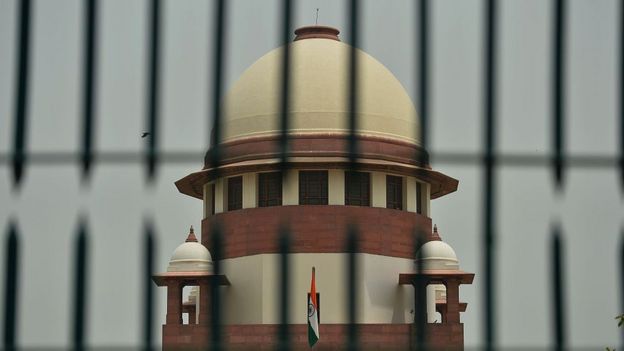They also issued a letter to the Supreme Court Chief Justice on issues relating to listing the cases in the Supreme Court.
What is the case allocation? Who is deviating?
The supreme court case listing is a list of cases assigned to investigate sessions with a limited number of judges.
The Chief Justice of the Supreme Court concludes that when a case is to be called for trial.
The privilege is known as 'master of the roster'. Therefore, the Supreme Court of Justice concludes setting up a session to investigate a specific case.
According to the procedure and procedure and office of the Supreme Court, 2017; The list of cases is prepared by the Supreme Court registrar on the orders of the Chief Justice.
Last November, 2017, Supreme Court Chief Justice Justice Deepak Mishra, chaired by the Chief Justice of the Supreme Court, ruled that 'Master of the Roster'
Deepak Mishra said no judge could accept it as his authority unless the Chief Justice was granted.
The importance of the case quota
When four Supreme Court judges spoke openly about the authority of the Supreme Court Chief Justice, the Supreme Court's case allocation issue came to light.
Cases allocate Supreme Court Chief Justice to all the rights that are reported to them, "the first in the balance of the judges, the chief justice first, he said, more than, less than," There's terivittullanartarpotaiya the socio-political and cultural context of the legal text explanation ready to be unarappatuki Duvall.
Therefore, these judges can understand the Session Act as the same.
But we can interpret different ways of identical facts.
These 4 judges are also opposed to the list and allocation of cases by the Supreme Court Chief Justice.
They have alleged that allocation of cases to the country and the country's system has been given to specific sessions without any analysis based on the Chief Justice's wishes. I was worried.
"The Supreme Court Chief Justice has great powers in allocation of cases, which is very important in decision-making and can be done by anyone who wants to misuse it." Nobody can question this because there is no legal provision for allocation of cases, "he said. "All the way
What is the procedure in other countries?
There are 25 judges in the Supreme Court of India. These judges will be in 2 or more sessions.
There are 9 judges in the Supreme Court of the United States. These 9 people will participate in the same session to investigate the case.
There are 12 judges in the Supreme Court of Britain. 5 or 6 judges will be held in a session. Both countries have reduced the cases of judicial examination of judicial magistrates.
But In India, the Chief Justice has the power to allocate cases to fellow judges.
What is the case allocation? Who is deviating?
The supreme court case listing is a list of cases assigned to investigate sessions with a limited number of judges.
The Chief Justice of the Supreme Court concludes that when a case is to be called for trial.
The privilege is known as 'master of the roster'. Therefore, the Supreme Court of Justice concludes setting up a session to investigate a specific case.
According to the procedure and procedure and office of the Supreme Court, 2017; The list of cases is prepared by the Supreme Court registrar on the orders of the Chief Justice.
Last November, 2017, Supreme Court Chief Justice Justice Deepak Mishra, chaired by the Chief Justice of the Supreme Court, ruled that 'Master of the Roster'
Deepak Mishra said no judge could accept it as his authority unless the Chief Justice was granted.
The importance of the case quota
When four Supreme Court judges spoke openly about the authority of the Supreme Court Chief Justice, the Supreme Court's case allocation issue came to light.
Cases allocate Supreme Court Chief Justice to all the rights that are reported to them, "the first in the balance of the judges, the chief justice first, he said, more than, less than," There's terivittullanartarpotaiya the socio-political and cultural context of the legal text explanation ready to be unarappatuki Duvall.
Therefore, these judges can understand the Session Act as the same.
But we can interpret different ways of identical facts.
These 4 judges are also opposed to the list and allocation of cases by the Supreme Court Chief Justice.
They have alleged that allocation of cases to the country and the country's system has been given to specific sessions without any analysis based on the Chief Justice's wishes. I was worried.
"The Supreme Court Chief Justice has great powers in allocation of cases, which is very important in decision-making and can be done by anyone who wants to misuse it." Nobody can question this because there is no legal provision for allocation of cases, "he said. "All the way
What is the procedure in other countries?
There are 25 judges in the Supreme Court of India. These judges will be in 2 or more sessions.
There are 9 judges in the Supreme Court of the United States. These 9 people will participate in the same session to investigate the case.
There are 12 judges in the Supreme Court of Britain. 5 or 6 judges will be held in a session. Both countries have reduced the cases of judicial examination of judicial magistrates.
But In India, the Chief Justice has the power to allocate cases to fellow judges.

Comments
Post a Comment